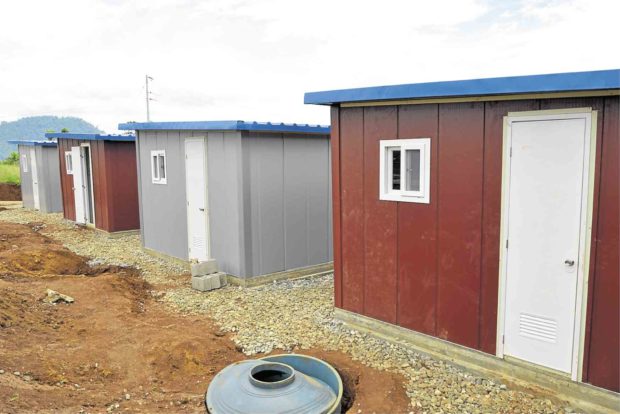
Residents displaced by the war in Marawi City will start a new life in temporary shelters in the village of Sagongsongan.
MARAWI CITY—While residents displaced by the five-month fighting between government soldiers and terrorists have started to return to their villages this week, some 500 families are assured that they will have houses to call their own once they leave evacuation centers, officials said.
This was after the government committed to finish by the second week of December 500 units of temporary shelters that would be given to an initial batch of families, who left the city after Islamic State-inspired gunmen attacked Marawi in late May, presidential spokesperson Harry Roque said here on Wednesday.
Roque said these units were part of 1,200 temporary shelters that the National Housing Authority and the Department of Public Works and Highways were building in Barangay Sagongsongan here.
The beneficiaries are families whose houses were burned or destroyed in airstrikes launched by the military to flush out terrorists.
Roque said the Task Force Bangon Marawi (TFBM), the government body tasked in leading the rehabilitation of the city, was working double time to build at least 1,170 temporary houses by the first quarter of 2018. The remaining 30 units would be completed after that schedule.
Secretary Eduardo del Rosario, TFBM head, said the temporary housing area was carefully planned and was aimed at providing residents with basic needs like water and electricity.
“This is to give them a comfortable living space,” he said.
Del Rosario said the government decided to allow residents, whose properties in the main battle areas were either destroyed or damaged, to put up new structures as long as they could show land titles.
The ground zero of the Marawi fighting covered 24 villages, which composed the city’s business district.
But Del Rosario said property owners in these villages would only be allowed to construct after the area had been “flattened” or cleared of debris and infrastructure changes had been introduced there. This, he said, could take about three years.
“There will be changes because if we make the roads four or six lanes [wide], for example, [then] their properties would shrink,” he said.
Roque said President Duterte had ordered Del Rosario and officials of the Armed Forces of the Philippines to look into the military reservation here.
A large section of Marawi, Roque said, had been identified as a military reservation. Based on earlier estimates, at least 6,000 hectares of the city’s more than 8,000 ha land area were set for military use.
“The President’s mandate was for the determination of how large the area that the military needed. Those that the military did not need should be given to the landless,” he added. —DIVINA SUSON